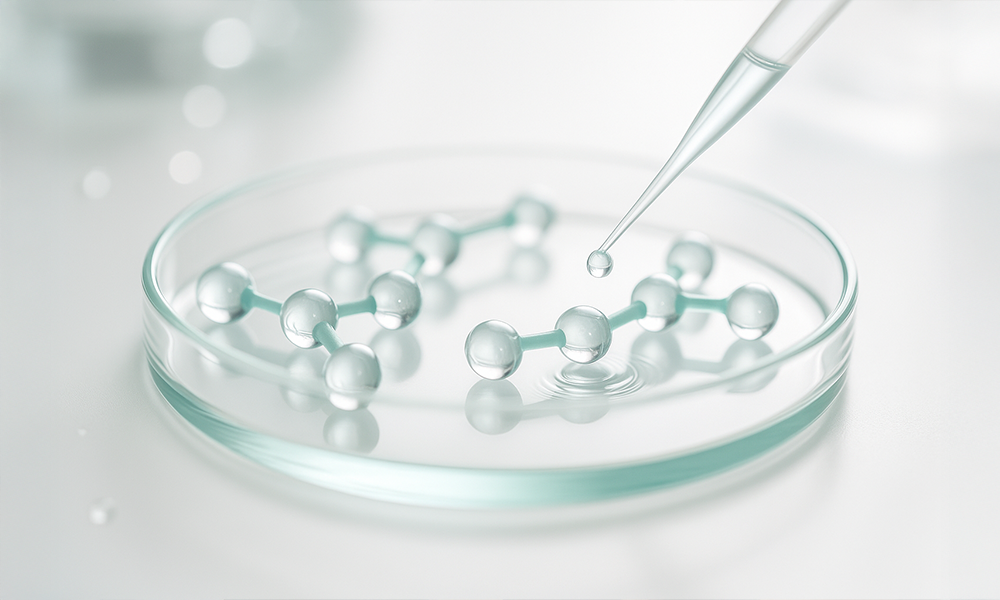What Are Peptides — And Why They Matter
Tiny chains. Massive impact.Peptides are the natural language your body already speaks — unlocking regeneration, repair, and vitality at the cellular level.
Shop Now
What are Peptides?
Nature’s Smallest Healers
Peptides are short chains of amino acids — the same building blocks that make up proteins.
Think of them as messengers that tell your body what to do. Some signal the skin to repair, others tell muscles to grow, or direct inflammation to calm.
They’re not new. Your body already produces hundreds of peptides every day — but as we age, those signals weaken.
Supplemental peptides restore that natural communication, helping your body do what it’s designed to do: heal itself.


How Peptides Work in the Body
Precision at the Cellular Level
Unlike synthetic drugs that override systems, peptides reinforce natural communication.
Signal: A peptide binds to a specific receptor on the cell surface.
Translate: The cell reads that signal as an instruction (e.g. “produce collagen,” “repair tissue,” “burn fat”).
Activate: Your body initiates that natural process with more efficiency and balance.
Signal → Translate → Activate.
“Peptides don’t force the body — they remind it how to function optimally.”
The Difference Between Peptides and Proteins
Smaller, Smarter, and More Targeted
They act as signaling entities via all domains of life and interfere with
protein-protein interactions, which are indispensable in bio-processes. Short peptides include fundamental molecular information for a prelude to the symphony of life. They have aroused considerable interest due to their unique features and great promise in innovative bio-therapies.
Full Story - Click Read Article
Size
Function
Absorption
Purpose
Peptides
Short chains (2–50 amino acids)
Targeted signaling
Rapid, bioavailable
Repair, regeneration, metabolism
Proteins
Long chains (50+ amino acids)
Broad structural roles
Often requires digestion
Structure, energy, enzymes

Refined by Science. Rooted in Nature.
Modern research has identified over 7,000 peptides in the human body — each playing a unique role in metabolism, immunity, and repair.Through biotechnology, scientists have isolated and stabilized key therapeutic peptides that can safely support:
Grounded in Data. Guided by Ethics.
Cura Peptides sources from FDA-registered,
GMP-certified facilities, ensuring purity and consistency.
Each peptide is tested for identity, sterility, and potency through third-party analysis.Important Note:Cura Peptides products are for research use only and not intended to diagnose, treat, or cure any medical condition.
Always consult a qualified professional before beginning any supplementation or peptide protocol.
The Benefits of Peptides
Mental & Cognitive
Improves focus, memory, and mood
Semax, Selank, MOTS-C
Performance & Recovery
Boosts energy, repairs tissue
BPC-157, TB-500, CJC-1295
Aesthetic & Anti-Aging
Supports collagen, reduces wrinkles
GHK-Cu, Epithalon
Metabolic & Fat Loss
Enhances glucose metabolism, appetite regulation
GLP-1, Tesamorelin
Cardiovascular & Cellular Health
Lowers inflammation, improves circulation
MOTS-C, Thymosin Beta-4
Stay Updated on Research
Subscribe to our newsletter for the latest insights and breakthroughs in peptide research.

FAQs
Explore common inquiries about peptide research and its applications in various fields.
Peptide research involves studying the structure and function of peptides. It explores their potential therapeutic applications and biological roles. This research is crucial for developing new treatments and understanding cellular processes.
Credibility in peptide research is ensured through peer-reviewed studies and clinical trials. Researchers follow strict protocols and ethical guidelines. This rigorous process helps validate findings and supports their application.
Peptide applications range from therapeutic uses in medicine to advancements in biotechnology. They are utilized in drug development, diagnostics, and as research tools. Their versatility makes them valuable across various scientific fields.
While peptides are generally safe, potential risks include allergic reactions or side effects. It's essential to conduct thorough research and consult professionals before use. Understanding these factors ensures safe application in research.
Staying updated on peptide research can be achieved through academic journals and conferences. Following reputable sources and organizations in the field is also beneficial. Engaging with online communities can provide insights and discussions.
